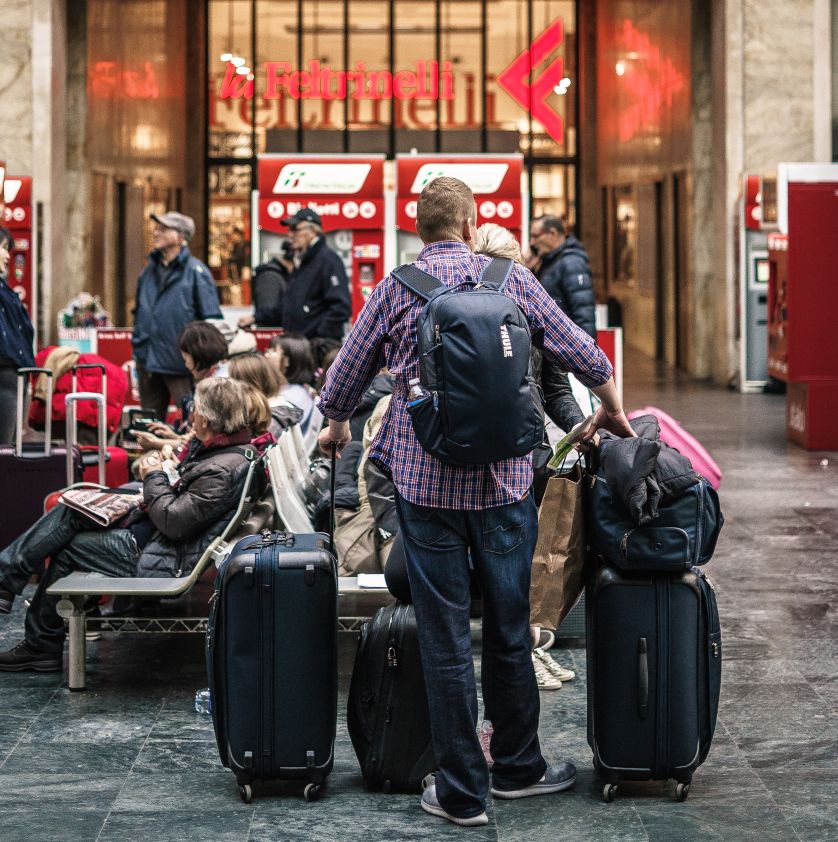You have just been hired in Switzerland? Congratulations!
Moving to Switzerland requires excellent organisation. You need to know the list of documents required for each administrative step.
Please find below a 9 step methodical guide to organize your arrival in Switzerland.
Step 1 – Finding accommodation in Switzerland
Finding a place to live means asking the right questions. Where to live? In the city? In the countryside? Do you choose to live near your job?
Depending on the line of business and whether remote working is developed in the company, your decision may be very different.
If you are employed by a company not too far from the border, you can choose to live in France, Germany or Italy. Your status is that of a ‘cross-border worker’.
Please read the advice on budget housing and transport for cross-border workers.
Housing prices vary considerably between Switzerland and the border area. It is important to take into account a number of criteria: will you be alone, with your partner or with your family? Is being close to schools important? Do you prefer the city centres, suburban areas or the countryside an apartment or a villa? Will your spouse have a professional activity?
Once you have found your accommodation and signed the lease, the first step of the administration procedures is completed.
| Checklist signature of the rental lease in Switzerland | |
| Copy of your ID |  |
| Employment contract in Switzerland |  |
| Certificate of non-prosecution aka ‘attestation de non poursuite’ (if in Switzerland for more than 3 months) | |
| Household liability insurance offer or policy (if in Switzerland for more than 3 months) |  |
| For students, copy of the ID of the guarantor for the accommodation |  |
| For students, last 3 payslips of the guarantor for the accommodation |  |
| Bank rental guarantee or surety |  |
Step 2 – Work permit, residence permit
Your employer will initiate the process to get you a work permit, which allows you to work in Switzerland. You must complete the residence permit formalities for your spouse and other family members. This settlement permit will allow them to reside in Switzerland.
Work permits and residence permits have validity periods that must be respected. Renewal procedures are straightforward, provided they are done on time.
The conditions for obtaining permits vary according to the nationality of the foreign national. The administrative documents required to live in Switzerland differ according to the duration of the work and the type of employer (company, United Nations, NGO, etc.).
The list is as follows:
- B EU/EFTA permit ‘livret pour étranger’ for those who live in Switzerland without necessarily working there.
- FDFA Legitimation card for those working in organisations such as the United Nations.
- Work permits for those working in other companies.
All Swiss administrative procedures require one of these documents
| Checklist work permit (to be sent to your employer) | |
| Copy of your ID |  |
| Employment contract in Switzerland |  |
| Certificate of non-prosecution aka ‘attestation de non poursuite’ (if in Switzerland for more than 3 months) |  |
| Household liability insurance offer or policy (if in Switzerland for more than 3 months) |  |
| Checklist B EU/EFTA permit ‘livret pour étranger’ (to be sent to the Cantonal Office or to the municipality of residence) | |
| Family Certificate issued by the authorities of the country of origin confirming that the person is a member of the family | |
| Tax payment certificate | |
| Copy of your I.D. | |
| Family record book ‘Livret de famille’ | |
| Rental lease | |
Step 3 – Moving, personal belongings
Personal belongings
The third step is the relocation. With the arrival in Switzerland of your personal effects, you will have your first contact with Swiss customs.
You must apply for duty-free admission of your belongings.
In order to clear your effects you need to provide a household inventory that lists the price of each of your personal belongings (in Switzerland, this includes amongst others furniture, household appliances, clothes).
You can arrive in Switzerland without immediately moving your personal belongings. You then have 2 years to import them tax-free (exempt from duties). After this period, there will be taxation. If the family arrives in two stages: first the working spouse and then the rest of the family, the 2 year exemption for the common effects (household possessions,) is calculated from the second arrival.
Your vehicle
If you arrive from abroad with your motor vehicle, depending on the date of its purchase, it may be exempt from tax.
Otherwise, VAT will be estimated on the basis of the market value of the motor vehicle. The Swiss tax authorities have these estimates. You should use the services of a freight forwarder to complete the required forms. The main customs posts have forwarding offices.
Please note that importing a used car into Switzerland requires you to have its conformity checked at the ‘bureau des autos’ within 6 months of arrival in Switzerland. To avoid these procedures, many newcomers prefer to sell their vehicle before their arrival in Switzerland. They then buy a vehicle in Switzerland and can also benefit from the buoyant second-hand car market in the Confederation.
If you still want to import your car, you should pay attention to the name of the owner on the imported vehicle (you or your partner) and the specifics of importing vehicles.
| Checklist moving (to be sent to Swiss Customs) | |
| Customs declaration for clearance of household goods | |
| List of goods to be imported | |
| Rental lease | |
| Work contract (may be requested by Swiss customs) | |
| Registration confirmation from the commune of residence (may be requested by Swiss customs) | |
| Certificate of departure from the country of origin of the move (may be requested by Swiss customs) | |
| Foreign driving licence for the vehicle (may be requested by Swiss customs) | |
| Residence permit (may be requested by Swiss customs) | |
Step 4 – Subscriptions in Switzerland
After finding an accommodation, informing the authorities of your arrival, you will need to subscribe to banking, telephone, Internet and media services; payment for these services can be made by:
- Bank card
- QR-bills (paid via e-banking, mobile banking or at the post office)
- Direct debit (LSV), after the registration deadline, the individual no longer has to deal with future periodic payments. Payments are made automatically
- ebill, an internet portal presents invoices, payment is made with a single click
The bankcard of the country of origin can settle the first payments, but you should pay attention to the exchange rate
| Checklist subscriptions | |
| Bank current account | |
| Bank card | |
| Bank Web Banking | |
| Electricity | |
| Telephone | |
| Internet | |
Step 5 – Compulsory and optional insurance when living in Switzerland
When you arrive in Switzerland with or without a move, your personal belongings will have to be insured. You will also have to insure your home and your health.
It is very important to examine the compulsory and optional insurance policies when you come to live in Switzerland.
| Compulsory (C) or optional (O) insurances when living in Switzerland | ||
| Fire | C | To protect the home and its contents |
| Household and household inventory | C | To protect the home and its contents |
| Civil liability | C | To cover damage that family members or pets could do |
| Basic LAMal health insurance | C | Compulsory LAMal Health Insurance |
| Complementary health insurance | O | Complementary insurance to access a higher level of care and widen the coverage (natural medicine, dental, international…) |
| Accident | C | For employees: risk covered by the employer For non-employed: to be taken out at the same time as the compulsory and complementary insurance |
| Motor vehicle | C | To protect against damage generated by your vehicle |
| Casco | O | To reimburse the repairs of an accident on your vehicle |
| Legal protection | O | To benefit from legal assistance if required |
Step 6 – Schooling
There are three language regions in Switzerland. Compulsory education is done in the language of the linguistic region (in French in French-speaking Switzerland, in German in German-speaking Switzerland, in Italian in Ticino).
The state school system also offers bilingual courses in English from middle school (also called ‘Gymnase’). However, in the English bilingual curriculum, the command of two national languages is compulsory. Subject to the new school and the school reports from the previous school, an entrance test may be required.
For children of expatriates who do not plan to stay in Switzerland for a long time, private schools offer courses entirely in English. In addition to the Swiss Maturité (studied by 15 to 18 year old students), public schools offer the International Baccalaureate (IB), the French Baccalaureate, the German Abitur, etc. If you plan to enrol your children in a particular private school, its location should be taken into account when choosing your place of residence.
School bus routes can take a long time. Long journeys are tiring for children.
| Checklist school enrollment | |
| Registration Form | |
| School reports | |
| Civil Liability Insurance Certificate | |
| Accident Insurance Certificate | |
| Medical instructions and allergy declaration form | |
| Canteen registration | |
| School bus reservation | |
Step 7 – Further steps
Driving licence
When you arrive in Switzerland, you must submit your driving licence issued by the country of origin to the ‘bureau des autos’ within 12 months of arrival in Switzerland, which will be replaced by a Swiss driving licence. If you miss this deadline, the Confederation may ask you to retake your driving test.
Certificate of ‘non-prosecution’
The certificate of ‘non prosecution’ is a document that is proof that the resident in Switzerland does not have any unpaid debts. A creditor at the start of a transaction can request it. Employers ask for it as part of the periodic screening of their employees. The cantonal debt enforcement office issues the certificate of ‘non prosecution’. It can be obtained online or by going to the Office and usually takes around 5 working days.
Clean criminal record certificate
You can request your Swiss criminal record certificate online. In order to keep the request confidential, send a postal request at the same time with the payment and the Internet request. You should receive the document 10 working days later. When the request is processed, you will be informed by the administration on how long it will take to process.
Each Swiss canton offers an internet follow-up service for administrative procedures.
| Checklist previous residence | |
| Driving licence | |
| Certificate of ‘non-prosecution’ | |
| Criminal record | |
| Cantonal administrative procedures | |
Step 8 – Completing the termination process
Don’t forget to complete the termination process in the country you are leaving such as cancelling subscriptions, checking that the invoices for cancelled subscriptions are no longer debited form your Bank account, cancelling insurance, checking reimbursements of subscriptions for the period not covered, collecting the social and tax documents.
Checklist previous residence:
- Cancel subscriptions
- Check that the invoices for cancelled subscriptions are no longer debited from your Bank account
- Cancel insurance
- Check reimbursements of subscriptions for the period not covered
- Collate social and tax documents
| Checklist further steps | |
| Cancel subscriptions | |
| Check direct debits | |
| Check reimbursements | |
| Tax clearance from the previous country of residence | |
| Social clearance from the country of previous residence (‘points’ for pension, provident funds) | |
Step 9 – Your procedures at the consulate of your country of origin
If you are not a Swiss citizen, consider registering with the consulate of your country of origin.
| Checklist country of origin | |
| Register at the Consulate | |
| Register as a non-resident elector | |
Link to useful information
We hope that this guide has helped you in your move to Switzerland.
You can download and print all our checklists.
Whether you are an expatriate, a cross-border worker or a Swiss national returning to the Switzerland, you can find all the other information you need in the following articles:



